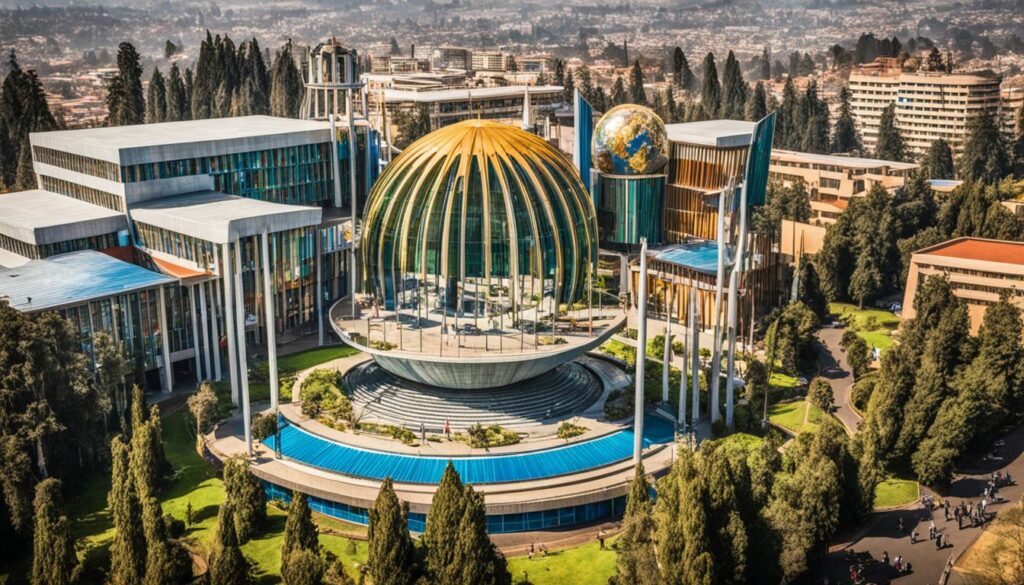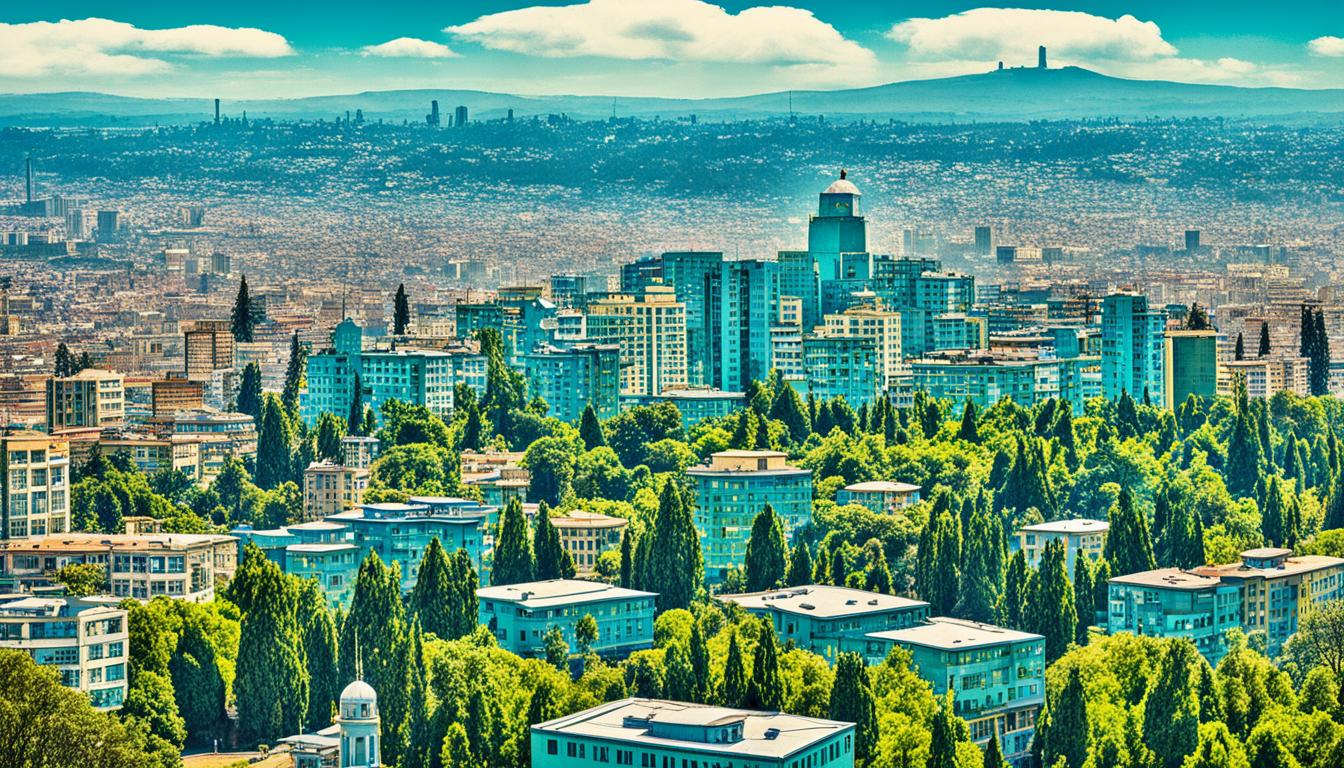How Big Is Addis Ababa?
Welcome to our article about Addis Ababa, the capital city of Ethiopia. Have you ever wondered about the size of this bustling metropolis? How does it compare to other cities around the world? In this article, we will explore the fascinating facts and figures that reveal just how big Addis Ababa really is.
But first, let’s take a moment to appreciate the vibrant and diverse culture of this city. With its rich history and unique blend of traditions, Addis Ababa has a charm that captivates both locals and visitors alike. Now, let’s delve into the size and significance of the capital city of Ethiopia.
Key Takeaways:
- Addis Ababa is the capital and largest city of Ethiopia.
- The city’s population is estimated to be in the millions.
- Addis Ababa serves as an important cultural, artistic, financial, and administrative center.
- It is home to Addis Ababa University and headquarters of major international organizations.
- Addis Ababa plays a crucial role in Ethiopia’s development and growth.
The Founding History of Addis Ababa
Addis Ababa, the dynamic capital and largest city of Ethiopia, has a fascinating founding history dating back to the late 19th century. Its establishment can be attributed to the visionary leadership of Menelik II, the Negus of Shewa.
In 1886, Menelik II, recognizing the need for a new capital, selected the site of Addis Ababa as a replacement for the previous capital, Entoto. Initially, Addis Ababa was a resort town known for its abundant mineral springs, which attracted nobility and led to the establishment of permanent settlements.
In 1887, Menelik II transformed Addis Ababa into his imperial palace, symbolizing the city’s growing importance. Two years later, in 1889, Addis Ababa officially became the capital of Ethiopia, marking a significant milestone in the country’s history.
The founding of Addis Ababa was characterized by rapid development, initially without prior planning. To guide the city’s urban development, subsequent master plans were implemented, shaping its growth and layout over time.
Menelik II’s vision and strategic decision to establish Addis Ababa as the capital city laid the foundation for its future growth and significance. Today, the city stands as a testament to Ethiopia’s rich history and serves as a vibrant hub of cultural, political, and economic activities.
Addis Ababa’s Growth and Development

Addis Ababa experienced a significant economic boom in the 1920s, which led to the construction of stone houses and a rise in middle-class-owned buildings. The city also witnessed rapid urbanization and modernization during the Italian occupation from 1936 to 1941. French and British consultants developed master plans in the 20th century that focused on monuments, civic structures, satellite cities, and the inner-city.
Despite these developments, Addis Ababa continued to grow at a fast pace, cementing its position as a major center for trade, banking, and international organizations. The city’s urban landscape transformed dramatically, showcasing its progress and becoming a reflection of Ethiopia’s expanding economy.
As new buildings and infrastructure emerged, Addis Ababa became a symbol of progress and modernity. With its bustling streets, contemporary architecture, and vibrant city life, this capital city exemplifies the country’s commitment to growth and development.
Furthermore, Addis Ababa’s status as a major economic and cultural hub continues to draw both domestic and international visitors, further contributing to its burgeoning economy and reputation as a cosmopolitan city. The city’s dynamic growth showcases Ethiopia’s desire to embrace the future while preserving its rich heritage.
Addis Ababa as a Cultural and Educational Hub

In the heart of Ethiopia lies Addis Ababa, a city of immense cultural significance and education. At the forefront stands Addis Ababa University, a prestigious institution that fuels the intellectual growth and development of the nation.
Home to a thriving arts scene and a strong fashion industry, Addis Ababa is a city where culture comes alive. The vibrant streets are filled with creativity, reflecting a rich heritage and a dynamic present. From traditional art forms to contemporary expressions, there is no shortage of cultural experiences to be had.
Addis Ababa’s younger generation is highly engaged in civic and political activities, making it a breeding ground for progressive ideas and movements. The city’s dynamic energy and intellectual discourse contribute to its reputation as a cultural and educational center.
As the capital of a country experiencing rapid economic growth, Addis Ababa serves as the headquarters for major international organizations such as the African Union and the United Nations Economic Commission for Africa. The presence of these institutions further enhances the city’s status as a center of knowledge, innovation, and global influence.
To encapsulate the cultural and educational significance of Addis Ababa is to understand its role as the heart and soul of Ethiopia. It is a city that embraces tradition while embracing progress, offering its residents and visitors a harmonious blend of past and present.
Exploring Addis Ababa University
One of the key pillars of Addis Ababa’s educational prominence is Addis Ababa University. Founded in 1950, this esteemed institution has played a pivotal role in shaping the minds of countless students, both domestically and internationally. With its diverse range of faculties, research centers, and libraries, the university is a hub of knowledge and intellectual growth.
Through its commitment to excellence in education, Addis Ababa University has nurtured leaders and visionaries, empowering them to contribute to the development and progress of Ethiopia. It stands as a testament to the city’s dedication to fostering educational opportunities and intellectual curiosity.
Addis Ababa’s Importance in Ethiopia’s Transportation Network
In Addis Ababa, we find a bustling transportation hub that plays a crucial role in Ethiopia’s connectivity. The city is strategically located with several major roads linking it to other key cities in the region. These road networks facilitate the movement of goods and people, making Addis Ababa a vital node in Ethiopia’s trade routes.
But it’s not just the roads that contribute to Addis Ababa’s significance as a transportation hub. The city is also home to the Bole International Airport, the main international airport in Ethiopia. Bole International Airport handles a significant amount of the import and export trade in the country, connecting Ethiopia to the rest of the world.
The presence of an international airport makes Addis Ababa a gateway for travelers and cargo, facilitating efficient trade and business exchanges. It serves as a vital link for Ethiopia’s economic growth, contributing to the country’s development and global connectivity.
Furthermore, Addis Ababa is host to the only railway system in Ethiopia, which connects the city to the ports of Djibouti and Asseb. This railway network plays a crucial role in transporting goods and raw materials, enhancing international trade and supporting economic activities.
Addis Ababa’s strategic location and well-connected transportation infrastructure make it a prominent collection and distribution center for both internal and international trade. The city’s transportation network supports the movement of goods, fuels economic growth, and strengthens Ethiopia’s position in global trade routes.
Recreational and Entertainment Options in Addis Ababa
While Addis Ababa may have limited formal recreational areas, the city offers numerous open spaces that are perfect for recreational activities. One popular option is to explore the nearby lake region, where visitors can enjoy boating, waterskiing, and bird-watching. The serene lakes provide a tranquil escape from the bustling city.
Addis Ababa is also renowned for its vibrant music and arts scene. Throughout the year, various cultural activities and events take place, showcasing the rich heritage and creativity of the city. Whether it’s attending live music performances, art exhibitions, or theater shows, there is always something exciting happening in Addis Ababa to satisfy every taste.
Sports enthusiasts will also find plenty of opportunities to engage in their favorite activities. Football (soccer) is by far the most popular spectator sport, with passionate fans filling the stadiums. Additionally, basketball, volleyball, and other sports are played, especially by school teams, fostering a sense of camaraderie and healthy competition among the youth.
Explore the Great Outdoors
With its picturesque surroundings and proximity to natural wonders, Addis Ababa offers endless possibilities for outdoor adventures. Whether you want to embark on a hiking expedition, go on a wildlife safari, or simply enjoy a leisurely walk in one of the city’s parks, there are recreational activities to suit all preferences.
From exploring the rugged terrain of the Entoto Mountains to discovering the tranquil beauty of the Rift Valley Lakes, Addis Ababa provides a gateway to breathtaking landscapes and unique flora and fauna. Nature lovers and adventure seekers alike will find solace in the recreational areas surrounding the city.
For those who prefer a leisurely pace, Addis Ababa also has a range of parks and gardens where you can relax and unwind. Whether it’s the vast greenery of Meskel Square or the manicured lawns of Unity Park, these recreational spaces offer a tranquil retreat from the urban hustle and bustle.
Immerse Yourself in Culture
In addition to its natural beauty, Addis Ababa is a cultural hub that celebrates Ethiopia’s rich heritage. The city is home to numerous museums, art galleries, and historical sites that showcase the country’s fascinating past and vibrant present.
One must-visit attraction is the National Museum of Ethiopia, which houses the famous fossilized hominid skeleton, Lucy. This iconic artifact, along with other archaeological treasures, provides a glimpse into Ethiopia’s ancient history and evolution.
For a deeper understanding of Ethiopian art and culture, the Ethiopian National Theatre and the Addis Ababa Museum are ideal destinations. These cultural institutions regularly host exhibitions, performances, and workshops, allowing visitors to immerse themselves in the vibrant traditions and artistic expressions of the country.
Whether you’re seeking outdoor adventures, cultural immersion, or sports activities, Addis Ababa offers a myriad of recreational and entertainment options to enrich your experience in this captivating city.
Conclusion
Addis Ababa, the capital and largest city of Ethiopia, is a dynamic and culturally diverse metropolis. With a population in the millions, the city has undergone significant growth and development, establishing itself as a vital hub for trade, education, and international organizations. The rich history of Addis Ababa, coupled with its vibrant cultural scene and wide range of recreational offerings, makes it an intriguing destination to explore.
As the capital of Ethiopia, Addis Ababa plays a pivotal role in the country’s overall development and growth. The city’s strategic location and well-connected transportation network make it an essential center for domestic and international trade. With its bustling streets, diverse neighborhoods, and impressive architecture, Addis Ababa offers a unique blend of traditional and modern experiences.
Whether you are strolling through the lively markets, exploring the fascinating museums, or indulging in the local cuisine, there is always something to captivate your senses in Addis Ababa. The city’s eclectic mix of cultures, languages, and artistic expressions creates an atmosphere that is both captivating and inspirational.
In conclusion, Addis Ababa is a city filled with energy, creativity, and boundless opportunities. Its vibrant culture, historical significance, and urban charm make it an ideal destination for travelers seeking an authentic Ethiopian experience. As you venture through the streets of Addis Ababa, you will discover a city that embraces its past while embracing the possibilities of the future.






